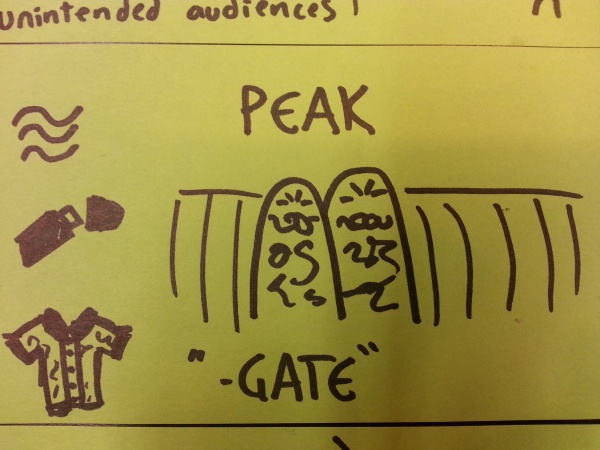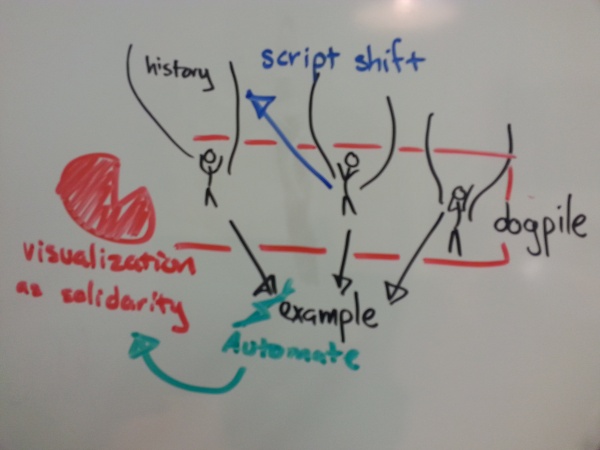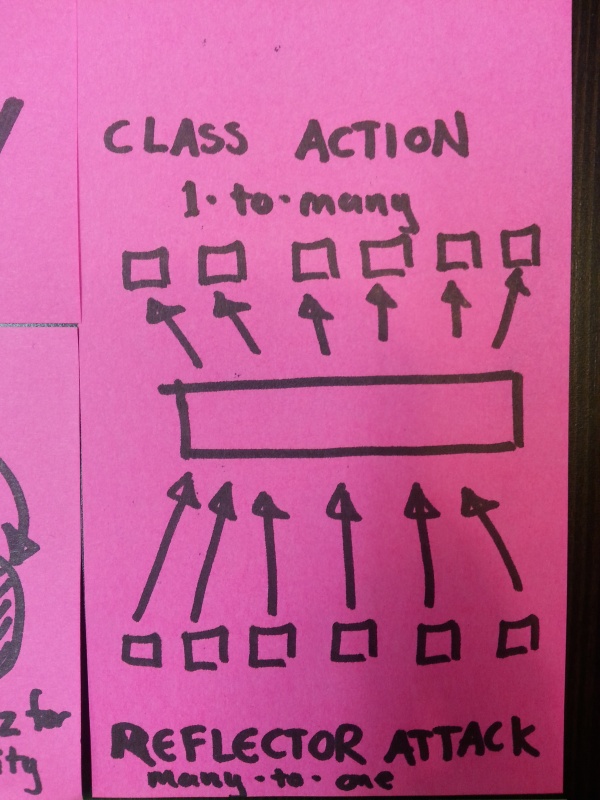Difference between revisions of "Components and workarounds of dog piles"
(Created page with ""Cumulative individual frustration expressed cumulatively." Attention economies Year in outrage Strokes: good > bad > none attention which demands more attention in respon...") |
|||
| (2 intermediate revisions by the same user not shown) | |||
| Line 1: | Line 1: | ||
| − | " | + | We posit that things like [http://www.slate.com/articles/life/culturebox/2014/12/the_year_of_outrage_2014_everything_you_were_angry_about_on_social_media.html the Year of Outrage] is due to "cumulative individual frustration expressed cumulatively." This is facilitated by a few main things: |
| + | * collective data on any related incident (by type, perpetrator, etc), | ||
| + | * the ease of sharing to amplify, rather than to examine, as happens on Facebook and Twitter (see also: [[Parameters of Interaction]]), | ||
| + | * when it comes to attention, or "[https://en.wikipedia.org/wiki/Transactional_analysis#Transactions_and_strokes strokes]," good > bad > none | ||
| + | ** "bad" is attention which demands more attention in response. | ||
| + | We feel this fast-cycle outrage detracts from the long-term engagement necessary to actually affect systemic change. | ||
| − | + | [[File:PeakGate.jpg|600px]] | |
| − | + | Because [http://en.wikipedia.org/wiki/Attention_economy attention is now scarce, rather than the means of production], this is not a thing to be dismissed. We need to re-frame the discussion to make use of attention to act ''on the long-standing issues, rather than on the individual currently representing those issues''. We suggest instead [[Visualizing solidarity]] such that focus can be re-placed accordingly. | |
| − | + | [[File:DogPiles.jpg|600px]] | |
| − | + | An example of this is saying "[https://twitter.com/thequux/status/512971059013115904 The definition of tacky: a conference organizer joking about how people who give talks at conferences don't get paid for it.]" and continuing to not name names, but rather evoking discussion of the larger issue at hand. | |
| − | inverse of class action | + | When dog piles DO happen, any single individual contributing is unlikely to see how their single slice can contribute to [http://juliepagano.tumblr.com/post/46206589124/my-experiences-in-tech-death-by-1000-paper-cuts death by 1000 cuts]. When orchestrated, this is called a [https://en.wikipedia.org/wiki/Denial-of-service_attack#Reflected_.2F_spoofed_attack reflector attack]. Holding individuals accountable in this case is an interesting inverse of a class-action lawsuit. |
| + | |||
| + | [[File:ManyToOne.jpg|600px]] | ||
[[Category: SFO]] | [[Category: SFO]] | ||
Latest revision as of 00:06, 18 May 2015
We posit that things like the Year of Outrage is due to "cumulative individual frustration expressed cumulatively." This is facilitated by a few main things:
- collective data on any related incident (by type, perpetrator, etc),
- the ease of sharing to amplify, rather than to examine, as happens on Facebook and Twitter (see also: Parameters of Interaction),
- when it comes to attention, or "strokes," good > bad > none
- "bad" is attention which demands more attention in response.
We feel this fast-cycle outrage detracts from the long-term engagement necessary to actually affect systemic change.
Because attention is now scarce, rather than the means of production, this is not a thing to be dismissed. We need to re-frame the discussion to make use of attention to act on the long-standing issues, rather than on the individual currently representing those issues. We suggest instead Visualizing solidarity such that focus can be re-placed accordingly.
An example of this is saying "The definition of tacky: a conference organizer joking about how people who give talks at conferences don't get paid for it." and continuing to not name names, but rather evoking discussion of the larger issue at hand.
When dog piles DO happen, any single individual contributing is unlikely to see how their single slice can contribute to death by 1000 cuts. When orchestrated, this is called a reflector attack. Holding individuals accountable in this case is an interesting inverse of a class-action lawsuit.


